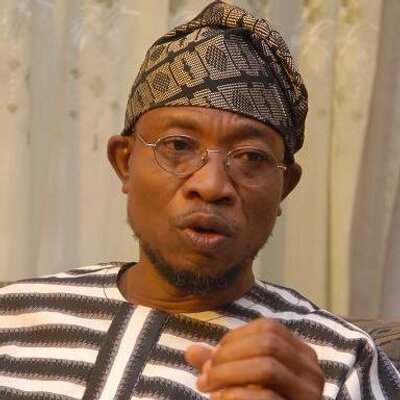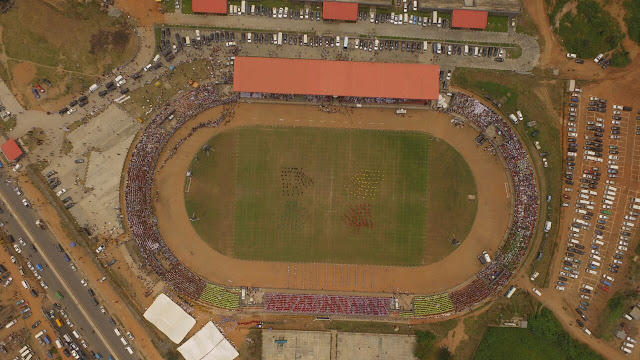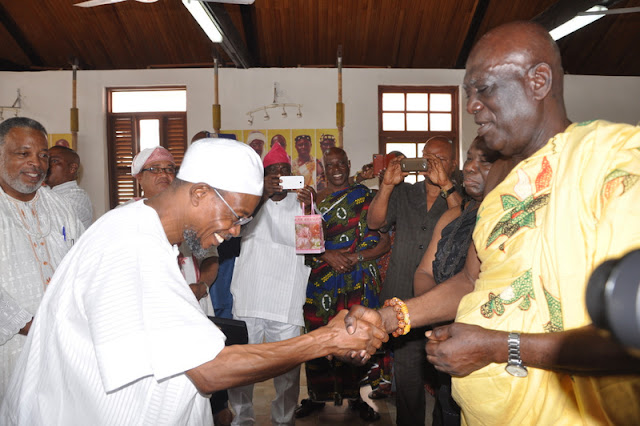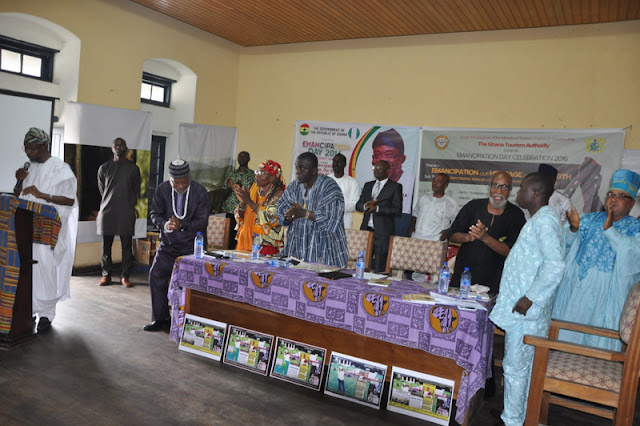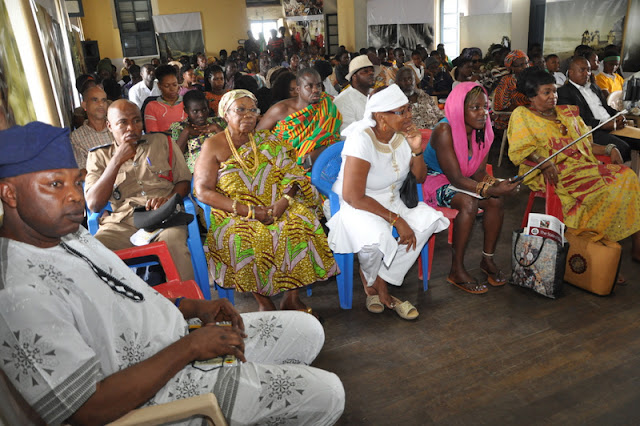Governor Rauf Aregbesola of the state of Osun has stated that according to a report by the Organisation of Economic Cooperation and Development (OECD), Africa led the global begging troupe with a total aid outflow to Africa in 2013 at $46 billion, only followed by Asia in a distant second with $25 billion.
The governor stated while delivering keynote at the 2016 emancipation celebration of the pan African historical, arts and culture festival (PANAFEST), which held at Cape Coast, Ghana, on Friday July 29, 2016.
The governor who took participants at the event on the historical role the west played in under-developing and subjugating Africa said Africans are not yet totally free as long as she remains the poorest and the biggest beggar region of the world.
On aide being delivered to the continent, Aregbesola stated that the figure for Asia topped $25 billon only because Afghanistan alone got a disproportionate amount of $11 billion that year. In Africa, one out of every two persons is poor.
“In a 2015 World Bank estimate of GDP per capita, the average for sub-Saharan Africa is $1,571.3 compared to Middle East and North Africa’s $7,342.3, or EU’s $31,843.2, North America’s monstrous $54,580 and even the world’s average of $9995.6. Even then, this average is this high because a few rich countries like Seychelles has per capita income in excess of $25,000 whereas there are poorer countries whose income is less than $400.”
The Ogbeni further stated that. “We are not free as long as the continent remains the hotbed of proxy wars between superpowers and now the theatre of religious and ethnic conflicts instigated by the elites and their foreign allies. Freedom and true emancipation must consist in the development of the continent’s human and material resources for the benefit of its 1.2 billion people.”
Read Ogbeni’s full speech below:
KEYNOTE ADDRESS DELIVERED BY THE GOVERNOR OF THE STATE OF OSUN, NIGERIA, OGBENI RAUF AREGBESOLA, AT THE 2016 EMANCIPATION CELEBRATION OF THE PAN AFRICAN HISTORICAL, ARTS AND CULTURE FESTIVAL (PANAFEST), HELD AT CAPE COAST, GHANA, ON FRIDAY JULY 29, 2016
Protocols,
EMANCIPATION; OUR HERITAGE, OUR STRENGTH: EMPOWERING THE AFRICAN YOUTH THROUGH PAN AFRICAN CULTURE
I am most pleased to be in Ghana, in the midst of our African people, for this year’s Pan African Historical, Arts and Culture Festival (PANAFEST). I will like to thank therefore the PANAFEST Foundation for the kind invitation to be the guest speaker at the Emancipation Day Celebration 2016.
PANAFEST began in this country in the mid-1980s, if my information is correct, as a cultural platform to bring continental and Diaspora Africans together to celebrate our history, reminisce on our past of enslavement and colonisation by especially European powers and work towards African development and unity.
Ghana has been an admirable ally in the African freedom project. She provides sanctuary for opposition figures engaged in freedom fighting all over Africa, especially Nigerians when the heat at home becomes unbearable. When Nigeria gets tough under any dictatorship, Ghana beckons. Ghana is also the country of the iconic Dr Kwame Nkrumah, the father of modern advocacy for African independence, development and unity.
This idea of Pan Africanism in itself predates this era. It began in the late 19th Century as a reaction to the trans-Atlantic slave trade in which people of Africa were hauled off to Europe and the Americas as commodities and converted to beasts of burden in plantations and for the development of their captors’ countries.
Slavery, the capture and exchange for commodity and transportation to Europe variety, that began in the late 16thCentury left our continent severely haemorrhaged and asphyxiated, with more than 60 per cent of the population within this period caught in the cruel web of slavery.
Huge populations were removed in daring brutal raids that often left communities and farms burnt. The very act of hiding from slave raiders disrupted and paralysed economic and social activities, reduced the workforce (and consequently productivity), curtailed potential markets and brought the agonies of separation to families. It not only slowed development, it wiped off technological advancement Africans had accumulated for more than 500 years and eliminated the parity the continent had with Europe. Worse still, it put a stigma of slavery on all black people, especially the Diaspora, that will take a miracle to remove.
We cannot even begin to quantify the consequences of slavery when according to one account by Walter Rodney, 50 human beings were exchanged for a horse or when humans were exchanged for a piece of mirror or a bottle of gin. How do we quantify the extreme cruelty of shackling the enslaved people, padlocking their mouths and skinning alive those that tried to escape and then hang their bodies on a post to rot in order to serve as deterrent to others?
Slavery was traumatic for the whole continent in that the captured faced the worst inhuman treatment while the free live under the constant fear and threat of being captured. Ira Berlin summarised it so aptly by writing that ‘the massive deportation traumatized black people, both slave and free’.
Colonialism took over where slavery ends and deepened the African misery. While slavery was the expropriation of humans only, colonialism was mindless expropriation of all resources (human and material), direct rulership and specific policy of underdevelopment by stripping the country of its mineral and agriculture resources for peanuts. Colonialists established political, social, economic, religious and moral superiority over Africans. The result of this is that we could no longer proceed on our own development path and also could not master the Eurocentric order imposed on us. They claimed to be on a civilising mission and used this to disrupt African social order and established a Eurocentric order. They disarticulated the economies of Africa and imposed an economic order in which Africa became the supplier of agricultural and mineral raw materials for European economy.
It might interest us all to note that cocoa was native to Central and South America where it was brought to West Africa in order to feed the chocolate industry in Europe and America. At present, some African countries in East and Central Africa pride themselves in planting rose carnations and exporting them to Europe, at serious neglect of food crops (that should feed our people) and other agriculture products (that should drive our industrialisation).
Slavery and colonialism combine to underdevelop our continent and created a gap of not less than 200 years between us and the rest of the world.
This is what made the legendary Ghanaian leader, Nkrumah, to make the famous admonition to Africa that ‘Seek ye first the political kingdom and all things shall be added unto you’. It was the quest to free Africa from the shackles of oppression that drove the pan-Africanist movement and nationalist agitation championed by the likes of Marcus Garvey, Haile Selassie, Julius Nyerere, Patrice Mulumba, Samora Machel, Modibo Keita, Nelson Mandela, Edward Blyden, Amilcar Cabral, Cheikh Anta Diop, Ahmed Sekou Toure, Kwame Nkrumah, Obafemi Awolowo, Nnamdi Azikiwe, Muammar Gaddafi, Malcolm X, W. E. B. Du Bois and many others, that culminated in the independence of African states from the late 1950s to as recent as the dismantling of the apartheid regime in South Africa in 1989.
It is important to keep this trajectory always before us in order to heed the warning of George Santayana that those who failed to remember the past are condemned to repeat it.
This is because while physical slavery and colonialism have been abolished, we are not yet free in the real sense of it. In the past, they used to forcibly capture our people to be able to take them to Europe, now we willingly queue at their embassies, pass the night taking turns and sometimes get whipped by our brothers working as security guards in those places, as we look for visas to travel abroad where we believe the grass is greener.
Worse still is the depressing account of tens of thousands daring the hostilities of the Sahara Desert in the hope to cross the Mediterranean Sea to Europe. From those lucky to cross the desert come heart rendering tales of men, women and children drowned in failed bids to cross the sea to Europe.
A survey conducted in the late 1980s reveals that there were about 5,000 Nigerian trained medical doctors in the United States. It should be more than that now. The human resources of Africa trained at great cost and meant for the development of the continent are being hijacked by others for their own development in what has been dubbed ‘brain drain’. There should be an international legal framework that awards reasonable compensation to a nation of origin that produces the human resources being engaged by another nation that has no hand in the making of that resource person.
On another hand, the slavery and oppression in the continent is being perpetrated by Africans, either in form of elite conspiracy or hegemony construction by an oligarchic few. Many of you are aware of developments in Nigeria where by conservative account, more than $40 billion oil proceeds could not be accounted for by the last administration and how this disrupted and almost collapsed the state system in the country. There are now very disturbing revelations of how functionaries of that government looted these funds.
We are not yet totally free as long as Africa remains the poorest and the biggest beggar region of the world. In a 2015 World Bank estimate of GDP per capita, the average for sub-Saharan Africa is $1,571.3 compared to Middle East and North Africa’s $7,342.3, or EU’s $31,843.2, North America’s monstrous $54,580 and even the world’s average of $9995.6. Even then, this average is this high because a few rich countries like Seychelles has per capita income in excess of $25,000 whereas there are poorer countries whose income is less than $400.
In another report by the Organisation of Economic Cooperation and Development (OECD), Africa led the global begging troupe with a total aid outflow to Africa in 2013 at $46 billion, only followed by Asia in a distant second with $25 billion. The figure for Asia topped $25 billon only because Afghanistan alone got a disproportionate amount of $11 billion that year. In Africa, one out of every two persons is poor.
We are not free as long as the continent remains the hotbed of proxy wars between superpowers and now the theatre of religious and ethnic conflicts instigated by the elites and their foreign allies.
Freedom and true emancipation must consist in the development of the continent’s human and material resources for the benefit of its 1.2 billion people. There must be a transition from the mode of producer of primary goods to value adding. Adding values creates a value chain that increases the momentum of development. For instance, the value of one kilogramme of cocoa powder that we export is multiplied by 5,000 times by the time we import it as chocolate. If we can make the same quality of chocolate, we could have earned 5,000 times the value we derive from cocoa powder in a value chain that includes revenue generation, wealth creation, job creation and spiralling effect of developing ancillary industries around this product. We can also imagine the value added if we can enrich uranium to weapon’s grade, instead of exporting mere ore.
Emancipation must also include political power and popular sovereignty residing with the people. This means that no one should be in position of political leadership without the express consent of the people through free and fair election of ‘one man one vote’ in which every vote counts. It will also mean that the policies and pursuits of the government must derive from the needs and direct requests of the people. This is the essence of the democratic project in which government emerges not only from popular will, but its policy choices clearly reflect the interest of the people as well.
Ghana is fortunate to have crossed this threshold if we consider that she has gone through two election cycles in which the incumbent party lost elections. Nigeria also crossed this threshold last year when the opposition candidate, Alhaji Muhammadu Buhari, defeated the then incumbent, President Goodluck Jonathan, to emerge president. Not many African countries are this fortunate. Many leaders are still reluctant to leave office and democracy is increasingly being cynically turned into a system of power grab and rulership legitimation.
According to Freedom House survey for 2016, Africa has remained on the same level of freedom it was in 2002 and its present rating is an abysmal 12 per cent free.
One of the ways to enhance Africa’s freedom and bring development is to empower the youth through African culture. This is because the youths are the future of the continent. Any society that does not develop its youth is set inexorably on the path of extinction.
Culture has been described as the totality of the way of life of a people. In the words of E.B. Tylor, it is ‘that complex whole which includes knowledge, belief, art, morals, law, custom and any other capabilities and habits acquired by man as a member of society’. For Damen L, culture is learned and shared human patterns or models for living; day-to-day living patterns. These patterns and models pervade all aspects of human social interaction. Culture is mankind's primary adaptive mechanism. For our purpose here, culture is the totality of how a people adapt to their environment.
While there are universal challenges of nature like food, housing, healthcare, clothing, transportation and communication, some others and aspects of this universality are specific to regions. For instance, while Africans battle with consequences of heat and humidity, some other regions’ challenge is cold. While entertainment is universal among humans, the forms of entertainment that derive from each region may be different.
The richness of African culture in music, fashion and arts therefore should be explored to empower the youths and bring development to the continent. But it will take decolonisation of the mind. Our educational institutions should be the centres for mental decolonisation and this must begin with teaching in indigenous African languages.
Good music, for instance, is universal and has its own language which attracts all people to it. There used to be African music that appeals to most Africans in the past. These include high life, produced in Ghana, Nigeria, Congo and other places, which irrespective of the language in which it was produced, was enjoyed across the continent. But we witnessed a dangerous trend in which Africans tried to copy Western music whose product is neither Western nor African and which cemented the hegemony of Western music that glorifies violence, hedonism, sex, rebellion and social disorder; totally devoid of African values, on the continent. There should be a deliberate attempt by the governments of Africa States to promote indigenous African music, using African instruments, among our youths, which reflects our culture and values of fear of God, hard work, mutual respect and excellency of wisdom.
There should also be conscious promotion of African fashion, in a way that will return the dominance of our garment industries. The predominance of Western taste in fashion brought with it the displacement of our garment industry, leading to the closure of 60 per cent of textile industries in the continent and loss of over 250,000 jobs. I have for a long time stopped wearing Western dresses. If 50 per cent of Africans should join me, that will be 600 million people wearing only African garments. It will not only empower the youths who will be absorbed into the fashion industry. The sheer force of its presence worldwide would push its market and acceptance beyond the continent, in what will be an unstoppable cultural export and local empowerment.
There should also be empowerment through arts and craft. The scramble for Africa in the late 19th Century saw to the looting of African arts and treasures, which soon found their ways to Euro-American museums and private collections. Since then, Africa has been on the periphery of the art scene. There should be an African arts renaissance to bring back the minds and hands that crafted the Ori Olokun, Benin bronze and other iconic artefacts from Africa. This will also re-impress on the world the creativity of Africans and find empowerment for our youths.
But there are hindrances to this lofty goal. Africans have been too atomised and increasingly becoming insular and provincial. In the past, there was greater interaction among Africans when there were no boundaries. People travel more then for work and leisure when ironically the technology of transportation was not this developed. While legal restrictions are being lifted with common passport in West Africa for instance, the space is increasingly being closed on foreigners. The opportunities in the continent should be opened so that more Africans can live and work in African countries other than their own. This will bring greater interaction, cross-fertilisation and diffusion of ideas and productive engagements for youths in the continent.
Indeed, for most of Africa, legal restrictions on movement of people should be removed. It is disheartening that only 11 African countries offer liberal access to other Africans. These are Seychelles, Uganda, Togo, Cape Verde, Guinea Bissau, Mauritania, Comoros, Rwanda, Djibouti, Madagascar and Somalia. Others like Mozambique have between seven per cent restriction to Equatorial Guinea with 100 per cent restriction. This has created a situation where Africans prefer to travel to Europe and the Americas than to other African countries.
Another problem is that Africa is the least economically integrated region in the world. This is best illustrated in the pattern of trade within the continent. According to the Economic Commission for Africa (ECA), in a 2015 report, only 14 percent of Africa’s total trade is within the continent. This implies that the remaining 86 per cent is with other regions. In contrast, North America’s internal trading is 61 per cent; EU is 62 per cent while Central America is 45 per cent.
The reasons for this, according to United Nations Conference on Trade and Development (UNCTAD) are that Africa produces primary products and imports finished products which the continent does not produce. Inter-Africa trade volume is low because buying from each other is like getting the same of the same. Intra-Africa trading is low also because of high tariff and non-tariff restrictions. Besides high tariff, the problem of long delays arising from border check, official corruption and highway banditry greatly discourage trade and business. This has encouraged informal trading in prohibited items through smuggling.
African should also freely exchange their currencies directly. In the absence of a common continental currency, it is sheer madness to first convert the Nigerian naira to the American dollar in order to buy the Ghanaian cedi and vice versa. This practice, apart from the difficulty of finding dollars, technically devalues both currencies.
The governments in Africa should do more to remove these impediments. If Africans don’t buy from Africans, there is no way we can maximise our comparative advantages, even distribute our needs and empower our youths.
In essence, for Africa to be truly emancipated, invincible foreign domination and internal oppression must be removed. The resources of Africa must be effectively used to benefit the people of Africa. The dream of a united and developed Africa pursued by the legends can only be realised when we increase the interaction between the peoples of the continent.
Let me thank once again, the Ghanaian Ministry of Tourism, the PANAFEST Foundation, in Ghana and in Nigeria (this should include the incredible twins, Taiwo and Kehinde Oluwafemi), for facilitating my coming here and giving me this wonderful opportunity to share my thought on our continent. I will also like to thank the Nigerian High Commission in Accra for the warm reception they gave us yesterday. I am eternally indebted to all my Ghanaian friends and associates, particularly Divine Dzegbla, the Nigerian community in Ghana, including Abdulrasak Animasahun, the leadership (C.O. Micheletti) and members of All Progressives Congress (APC), our party, in Ghana, other Africans at home and in the Diaspora here present and all men of goodwill.
I thank you all for your kind attention.
